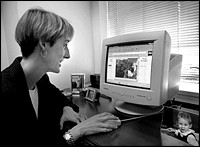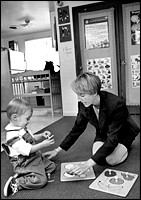     |
 |
|
P
A R E N T - V I E W . com
SAFE WEBCAM VIEWING SYSTEMS FOR DAYCARE
|
PRESS
AND MEDIA Keeping
an Electronic Eye on the Kids
Audrey Young was bursting with excitement yesterday as she showed envious co-workers the picture of her 2-year-old son, Gates, sitting on a swing. This was no framed photo on a desk. The image of Gates was flickering on the screen of her office computer in downtown Washington – and he was taking his swing ride at that very moment at a Fairfax City day-care center 15 miles away. A few minutes later, Gates popped up on his mother's computer again, stacking blocks in the playroom. And soon after that, she watched him eating some melon. A digital clock on the screen told her that the photo had just been snapped. "How wicked cool is this?" said Young, 36, president of a D.C. marketing firm. "I can see my guy! He's having a snack. Could this be much faster? We're only two or three seconds behind." Young and a handful of other parents with children in the same day-care center were the first Washington area workers to get such a clear view of their children's day, as a camera system that was introduced 1½ years ago made its local debut. About 75 child-care facilities across the country are using the "kiddie cams," which are being marketed as a way to alleviate working parents' concerns about the care and safety of their children. Cameras are placed in the rooms where youngsters play or sleep, and parents pay an extra fee to access the images over the Internet. The operators of Gates's day-care, Little Oxford House Early Learning Center, decided to purchase the system "to give parents peace of mind" about their children's activities, said Fatima Adnan, the facility's administrator. The center charges parents $20 a month for the special software, which is similar to what other parents across the country are paying for the service. The cost is worth it, although the urge to see little Johnny's face does wane over time, according to several parents who have been using the system for several weeks. "I don't need to check in all the time now because I know the opportunity is there," said Mary Ann Hendry, 31, whose 7-month-old boy attends Healthy Environment, a Wilmington, Del., day-care center that installed the cameras in February. The cameras tend to make parents feel better about their child's center on many levels, day-care providers say. "I feel like parents are more open to talk to us about things," said Gwen Lacy, director of Healthy Environment. "They actually can see things that are going on, so it gives them something to talk about. They can say, 'Oh, I saw that game you were playing.'" But some civil liberties groups have criticized the kiddie cams as an invasion of child-care workers' privacy. Some child-care specialists also are skeptical, saying that the cameras provide a false sense of security and that unannounced personal visits are still the best way to check up on a day-care center.
The security of the kiddie-cam system is also at issue. In most systems, parents go to a Web site and then have to enter a password to see the photos taken inside the day-care center. Nevertheless, officials at some centers say they don't plan to install the system because of the risk that people who prey on children might access the images and learn where a particular child is enrolled. "Regardless of how secure the system appears to be, hackers can always get in," said Mary Ellen Dallman, a regional vice president of Bright Horizons, a Cambridge, Mass., company that operates 155 day-care centers across the country, including four in the Washington area. Officials at KinderCare Learning Centers Inc., which has 1,147 centers nationally and 32 in the Washington area, also say they are not interested in kiddie cams. The companies selling the cameras say that even if a hacker managed to circumvent the password system, he would not learn any sensitive information because there are no names of children or day-care centers shown on the screen. Sales of the systems are growing rapidly, the companies say. Simplex Knowledge Co. in White Plains, N.Y., maker of the "I See You" system, is putting in cameras at five day-care centers next month, including one in Gaithersburg, said Patricia Martin, co-founder of Simplex. Young said she rarely gets to make unannounced visits to Little Oxford House because it is so far from her office. And after Gates's debut on-screen, Young said, she is hooked. She logged on 10 times yesterday to check on him. Young plans to keep her son's image on the screen during conference calls. And when she travels out of town on business three or four times a month with her laptop, Gates will be with her. "That's when your guilt really kicks in," she said. Russell File, 43, whose 2-year-old son, Nicholas, attends Little Oxford House, said he logged on about 20 times yesterday. "In my mind, this is what technology really ought to be about," said File, a technical consultant. "It's tough enough when you're leaving a kid at a day-care center. It's nice to be able to kind of candidly look in to see what's going on." |
COPYRIGHT 2000 - - PARENT-VIEW.COM. ALL RIGHTS RESERVED. TERMS


 "It's really misdirecting
what parents need to be doing to build that relationship with
the people who take care of their children," said Marcy Whitebook,
co-director of the Center for the Child Care Workforce, a nonprofit
group that studies day-care issues. "We're really a gadget
culture, and I don't think that gadgets can solve anything in
child care."
"It's really misdirecting
what parents need to be doing to build that relationship with
the people who take care of their children," said Marcy Whitebook,
co-director of the Center for the Child Care Workforce, a nonprofit
group that studies day-care issues. "We're really a gadget
culture, and I don't think that gadgets can solve anything in
child care."